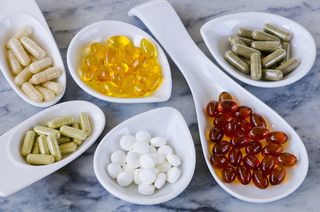Yohimbine Supplements Contain Drug-Like Doses

A supplement often touted for revving up sex lives actually contains doses of a supposedly natural compound that are so high that the product essentially acts like a drug, with potentially dangerous side effects, according to a new study.
Researchers analyzed the contents of about 50 dietary supplements sold in the United States that contained the ingredient yohimbine, a compound found in small amounts in the bark of an African tree called Pausinystalia johimbe. Many of the supplements claimed on their labels that they could improve people's sex lives, weight loss or athletic performance.
Although supplements made from P. johimbe bark extract would be expected to have low levels of yohimbine, the new study found high doses of the compound — up to 12 milligrams — in the supplements.
"What was surprising was how much yohimbine" was in supplements, said study co-author Dr. Pieter Cohen, an assistant professor of medicine at Harvard Medical School. What's more, the researchers did not find other compounds present in P. johimbe bark that they would expect from a true extract made from tree bark.
The supplements "were more similar to a prescription drug than they were to a natural extract," Cohen said. [Wishful Thinking: 6 'Magic Bullet' Cures That Don't Exist]
Indeed, yohimbine was previously developed into a prescription drug, and was tested for its ability to help people with sexual dysfunction. The recommended dose of prescription yohimbine was 5 to 10 milligrams. But the drug wasn't very effective, and it had side effects, including elevated blood pressure and panic attacks. Today, the drug has fallen out of favor, and is rarely prescribed, Cohen said.
The new findings are particularly concerning because other countries have banned yohimbine from supplements, citing the drug's potentially serious side effects, Cohen said. A 2010 study of California Poison Control calls found that there were more than 230 reports of health problems related to yohimbine supplements over a seven-year period, including gastrointestinal problems, a fast heart rate, increase anxiety and increased blood pressure.
Sign up for the Live Science daily newsletter now
Get the world’s most fascinating discoveries delivered straight to your inbox.
Given the high levels of yohimbine found in over-the-counter supplements, consumers should be informed of how much yohimbine is in the supplements, and should be made aware of the drug's side effects, which supplement makers are not required to list, Cohen said.
The new study found that just 22 percent of yohimbine supplements listed on the label how much of the compound was in the product, and most of these quantities were inaccurate. Moreover, 1 in 5 supplements did not list any side effects.
Together, just 4 percent of supplements studied listed both an accurate amount of yohimbine and at least one known side effect, according to the study, which Cohen conducted with colleagues at the National Center for Natural Products Research at the University of Mississippi.
"Our study demonstrates that consumers in the U.S.A. are unable to obtain adequate safety information from the overwhelming majority of yohimbine supplement brands offered for sale," the researchers wrote in their article, published today (Sept. 22) in the journal Drug Testing and Analysis.
Currently, supplements in the United States are regulated as foods, instead of as prescription drugs, so the effectiveness of supplements doesn't have to be proved before they are brought to market, and the pills don't need to be made in a standardized way.
The new study shows one example of why this regulation should change — some supplements contain doses of active ingredients that are as high as those in drugs, Cohen said. One way to reform the current laws would be to require that supplement manufacturers make their products in a standardized way, and to have manufacturers list quantities and side effects on the label, Cohen said.
Until this happens, consumers should avoid yohimbine supplements, he said.
The researchers noted that they analyzed only one sample of each brand of yohimbine supplement, and so the findings may not be representative of the quality of all yohimbine supplements sold in the United States.
Follow Rachael Rettner @RachaelRettner. Follow Live Science @livescience, Facebook & Google+. Original article on Live Science.

Rachael is a Live Science contributor, and was a former channel editor and senior writer for Live Science between 2010 and 2022. She has a master's degree in journalism from New York University's Science, Health and Environmental Reporting Program. She also holds a B.S. in molecular biology and an M.S. in biology from the University of California, San Diego. Her work has appeared in Scienceline, The Washington Post and Scientific American.

James Webb Space Telescope discovers mysterious 'red monster' galaxies so large they shouldn't exist

It would be easier to find aliens in a parallel universe than in our own, new multiverse study claims

Teen sickened with Canada's first human case of bird flu is in critical condition — and the source remains a mystery